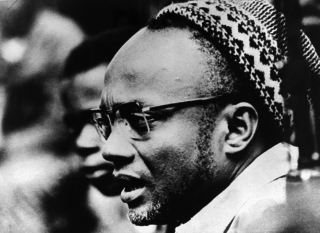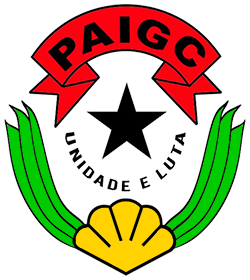
Politics of Cape Verde takes place in a framework of a semi-presidential representative democratic republic, whereby the Prime Minister of Cape Verde is the head of government and the President of the Republic of Cape Verde is the head of state, and of a multi-party system. Executive power is exercised by the President and the Government. Legislative power is vested in both the Government and the National Assembly. The Judiciary is independent of the executive and the legislature. The constitution first approved in 1980 and substantially revised in 1992 forms the basis of government organization. It declares that the government is the "organ that defines, leads, and executes the general internal and external policy of the country" and is responsible to the National Assembly.

The national flag of Guinea-Bissau was adopted in 1973 when independence from Portugal was proclaimed.

Parliamentary elections were held in Guinea-Bissau on 28 March 2004 after repeated postponements caused by political and financial chaos in the country, including a coup d'état that overthrew President Kumba Ialá in September 2003. The former ruling party, the African Party for the Independence of Guinea and Cape Verde (PAIGC), won the largest number of seats, but did not obtain a majority. Former President Yala's party, the Party for Social Renewal (PRS), came second with 35 seats.

This name uses Portuguese naming customs. The first or maternal family name is da Costa and the second or maternal family name is Cabral.

The African Party of Independence of Cape Verde is a former socialist party and currently a social-democratic political party in Cape Verde. Its members are nicknamed "os tambarinas" in Portuguese, and they identify themselves with the color yellow.

The Guinea-Bissau War of Independence was an armed independence conflict that took place in Portuguese Guinea between 1963 and 1974. Fought between Portugal and the African Party for the Independence of Guinea and Cape Verde, an armed independence movement backed by Cuba and the Soviet Union, the war is commonly referred to as "Portugal's Vietnam" due to the large numbers of men and amounts of material expended in a long, mostly guerrilla war and the internal political turmoil it created in Portugal. The war ended when Portugal, after the Carnation Revolution of 1974, granted independence to Guinea-Bissau, followed by Cape Verde a year later.

Elections in Guinea-Bissau take place within the framework of a multi-party democracy and a semi-presidential system. Both the President and the National People's Assembly are directly elected by voters.

The Struggle Front for the National Independence of Guinea was a political movement in Guinea-Bissau. Founded by groups opposed to the Marxist doctrine of Amílcar Cabral and the African Party for the Independence of Guinea and Cape Verde (PAIGC), FLING played a minor role in the national liberation struggle against Portuguese colonial rule.
Carlos Alberto Wahnon de Carvalho Veiga is a Cape Verdean politician. He was Prime Minister of Cape Verde from April 4, 1991 to July 29, 2000.

The unicameral National Assembly is the legislative body of the Republic of Cape Verde.

Operation Green Sea was an amphibious attack on Conakry, the capital of Guinea, by between 350 and 420 Portuguese soldiers and Portuguese-led Guinean fighters in November 1970. The goals of the operation included the overthrow of Ahmed Sékou Touré's government, capture of the leader of the African Party for the Independence of Guinea and Cape Verde (PAIGC), Amílcar Cabral, destruction of the naval and air assets of the PAIGC and its Guinean supporters, and the rescue of Portuguese POWs held in Conakry.

General elections were held in Guinea-Bissau on 3 July 1994, with a second round for the presidential election on 7 August. They were the first multi-party elections since independence, and also the first time the president had been directly elected, as previously the post had been elected by the National People's Assembly. In the presidential election, the result was a victory for incumbent João Bernardo Vieira of the African Party for the Independence of Guinea and Cape Verde (PAIGC), who defeated Kumba Ialá of Social Renewal Party in the second round. In the Assembly election, 1,136 candidates ran for the 100 seats, of which the PAIGC won 62.

Indirect parliamentary elections were held in Guinea-Bissau between 19 December 1976 and mid-January 1977, the first since independence from Portugal. At the time, the country was a one-party state with the African Party for the Independence of Guinea and Cape Verde (PAIGC) as the sole legal party. A single, official list of PAIGC candidates was presented to voters, although in some areas people voted for unofficial candidates, who achieved almost 20% of the national vote. The Assembly elected Luís Cabral to the post of President on 13 March 1977.

Indirect elections to a National Assembly were held in the parts of Portuguese Guinea held by the rebel African Party for the Independence of Guinea and Cape Verde (PAIGC) between August and October 1972, but not in the Portuguese-controlled areas of Bissau, Bolama, the Bissagos Islands and Bafatá.

Parliamentary elections were held in Cape Verde in June 1975 in preparation for independence from Portugal on 5 July. The African Party for the Independence of Guinea and Cape Verde was the sole legal party at the time, with voters being asked to approve or reject a PAIGC list of 56 members for the National People's Assembly. Its party leader was Aristides Pereira. The list was approved by 95.6% of voters, with a turnout of 86.7%.

Parliamentary elections were held in Cape Verde on 7 December 1985. The country was a one-party state at the time, with the African Party for the Independence of Cape Verde (PAICV) as the sole legal party. The PAICV presented a list of 83 candidates to voters to approve. The list was approved by 94.0% of voters, with a turnout of 68.9%.

Elections to the Legislative Assembly were held for the first and only time in Portuguese Guinea in March 1973.
The following lists events that happened during 1981 in Cape Verde.

Legislative elections were held in Guinea-Bissau on 10 March 2019. They were orginally scheduled for 18 November 2018 following an ECOWAS brokered agreement between President José Mário Vaz and the opposition in April 2018, but the electoral census was not completed until 20 November, and Prime Minister Aristides Gomes subsequently proposed 16 December, 30 December, or 27 January 2019 as possible alternative dates. The election date was settled following a presidential decree issued in December 2018.











